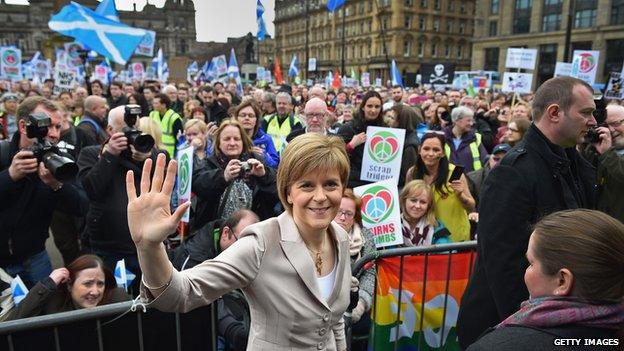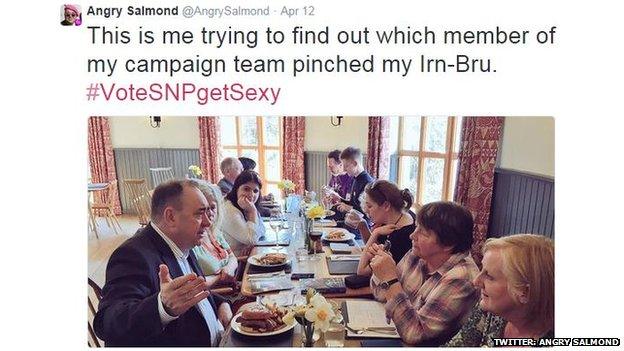Angry Salmond speaks: secrets of the SNP's social media strategy
- Published

Nicola Sturgeon attends a Campaign for Nuclear Disarmament rally against nuclear weapons
Viewed from social media, the SNP supporters can seem like the biggest group in the general election - but how did they become so active online?
If one party is most in control of the main general election Twitter hashtags, then it's the supporters of the SNP. In the first two weeks of the campaign, the nationalist tags #voteSNP" and #SNP were tweeted almost 30,000 times, the most frequently used hashtags every single day within the main general election streams (#GE2015 and #GE15). In addition, data released by Facebook on Wednesday indicated that chatter about SNP leader Nicola Sturgeon more than doubled in the first week of April.
The person behind the parody account Angry Salmond, external has some insight into why. Although Angry Salmond's tweets send up the SNP and its former leader Alex Salmond, the account also clearly supports the SNP ("I really don't think that anyone who supports wasting £100bn on nuclear weapons is fit to question the SNP's spending plans" was one recent tweet). Many SNP supporters online follow the account and interact with it.

Its anonymous author told BBC Trending that the independence referendum debate last year had created a social media culture and encouraged SNP supporters to share their political beliefs.
"The combination of social media and the referendum gave people reason to believe their opinion mattered," Angry wrote in an email. "It was the first major political event in the history of the British Isles where social media truly was a defining force and that legacy lasts to this day."
"The SNP do well at most things, so it's not very surprising we're incredible at social media too," he says.
A more sober analysis: "Twitter allows people who might have felt there was no-one else around them who understood them, to realise that millions of like-minded people are all over the country waiting to connect with them.... they are now able to discuss every news story with others who share their world view," he adds.
But some SNP supporters' prowess on social media has in the past, their opponents claim, translated into bad behaviour online such as trolling - when individuals or groups post hurtful and inflammatory comments which cause upset to others. BBC Trending has previously reported on the issue and quizzed SNP supporters about negative posts (they maintain that bad behaviour has in fact come from a minority of people on all sides). In the run up to last year's independence vote, the Yes Scotland campaign, external said that they had issued guidelines to supporters to not engage in such behaviour. "We need to persuade people to vote for us and you don't get that by being an abusive idiot," Stewart Kirkpatrick, the head of broadcast for the campaign, said at the time.
The SNP's opponents also claim that pro-nationalist accounts (sometimes referred to by the media as "CyberNats") seem to be paranoid about any negative media coverage of the SNP's campaign. Here's what Angry Salmond had to say about that: "calling what is a massive section of the Scottish electorate "paranoid" is fairly conceited, and to insinuate that paranoia alone will be the legacy of the referendum is doubly so. Ironically, the fact this question has been asked will only fuel the belief that the BBC frown upon nationalists in general".
SNP supporters are also highly disciplined when it comes to hashtag etiquette.
The freelance Scottish data scientist Gary Short, external, who is not an SNP supporter, told us that the party has an extraordinary reach because its supporters are very disciplined at putting out their message in a format which plays to Twitter's strengths.
"The SNP do best at amplifying their message," he said.
Since the beginning of the campaign, he has been collating every tweet sent which uses the hashtags #GE2015 or #GE15, and he says SNP supporters and the political party themselves are significantly more disciplined in using these tags when promoting their content.
"This means that their content is able to reach a wider audience, rather than just their immediate supporters who follow the official accounts," he says.
According to his figures, on just one day, 10 April, when the SNP tweeted an official message using the hashtag #GE2015, it was retweeted on average 118 times. When UKIP sent out a tweet using the same hashtag, it was retweeted on average 48 times, the Liberal Democrats were retweeted on average 8 times, Labour on average 0.6 times. The Conservative official accounts didn't use this hashtag at all that day. "Only their followers/supporters would have seen their content," says Short.
An SNP digital strategist told BBC Trending: "We actively encourage our members and supporters to use #voteSNP, #GE15 and #GE2015 hashtags to share our positive vision with the public on social media."
Other parties would maintain that their hashtags have been widely shared, albeit not in the general election stream.
Reporting by Hannah Henderson, external
Next story: Why "Save The Internet" is trending in India
You might also enjoy reading: David Cameron's 'thug life' on YouTube
You can follow BBC Trending on Twitter @BBCtrending, external, and find us on Facebook, external. You can even vote for us, external - we've been nominated for a Webby Award.